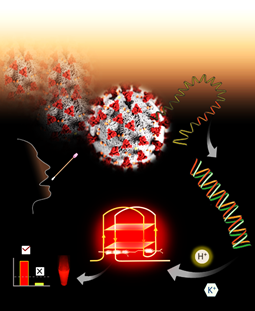- Six Reasons To Bring Millets To The Market!
- Hong Kong Court Makes Landmark Ruling Protecting Transgender Rights
- Substrate Promiscuity Of Fungi Generated Enzyme Laccase Shows Potential In Degrading Industrial Dye Effluents
- Union Minister Of Rural Development Holds A Meeting On ‘Cactus Plantation And Its Economic Usage’
- Ministry Of Tribal Affairs Organised One Day Mega Health Camp ‘Abua Bugin Hodmo-Our Better Health’ At Saraikela Kharsawan, Jharkhand
- Blue Flag Standards For Beaches In The Country
- India-Namibia Sign An MoU On Wildlife Conservation And Sustainable Biodiversity Utilization
- Hydrophobic Ingredients, In Combination With Obsolete Antibiotics, Can Counter Multidrug-Resistant Bacteria
- Promoting Cultivation Of Kala Namak Paddy
Scientists develop new technology platform to detect SARS-CoV-2 by fluorescence readout
Posted by: 2022-02-10 08:10:49 ,By Admin

A team of scientists has developed a new technology, platform for fluorometric detection of pathogens such as viruses by measurement of fluorescent light emitted. The potential of the new technology has been demonstrated for the detection of SARS-CoV-2. This technology platform can also be used to detect other DNA/RNA pathogens such as HIV, influenza, HCV, Zika, Ebola, bacteria, and other mutating/evolving pathogens.
Viruses are a major global threat to human health, and the ongoing Covid-19 pandemic caused by SARS-CoV-2 continues to inflict catastrophic effects on all aspects of our lives. The unprecedented transmission rate of RNA virus has necessitated the rapid and accurate diagnosis to facilitate contact tracing (prevent spreading) and to provide timely treatment.
Scientists from Jawaharlal Nehru Centre for Advanced Scientific Research (JNCASR), an autonomous institute of the Department of Science & Technology, Govt. of India, along with scientists from IISc (India Institute of Science), have demonstrated a noncanonical nucleic acid-based G-quadruplex (GQ) topology targeted reliable conformational polymorphism (GQ-RCP) platform to diagnose Covid-19 clinical samples. This work has been published recently in the journal ‘ACS Sensors’ and the team has also filed a patent for the novel technology.
The present work demonstrated the first GQ-targeted diagnostic platform for SARS-CoV-2 in clinical samples, based on a novel platform GQ-RCP. This molecular detection platform can be integrated into field-deployable isothermal amplification assays with more reliability and sequence specificity.
The platform lays greater emphasis on deciphering and systematic characterization of a unique set of interactions in nucleic acids to attain stable and reliable noncanonical DNA/RNA targets. The RCP-based target validation is a general and modular approach for the development of noncanonical nucleic acid-targeted diagnostic platforms for diverse pathogens, including bacteria and DNA/RNA viruses.
RT-q-PCR has been the gold standard for accurate detection of SARS-CoV-2 (Covid-19). Among the recent innovations on nucleic acid-targeted diagnosis of SARS-CoV-2, the techniques such as RT RPA and RT-LAMP use general-purpose DNA sensing probes. This increases the propensity of false-positive results arising out of unbiased detection of nonspecific amplification products. Recognizing unique DNA secondary conformations can be a promising solution to achieve reliable readouts. The team has identified and characterized a unique G-quadruplex-based target derived from the 30 kb (kilobytes) genomic landscape of SARS-CoV-2 for specific detection of SARS-CoV-2. Unlike the other reliable diagnostic assays where the existing fundamental concepts have been repurposed, this work presents a completely novel strategy to target a unique, unconventional structure specific to the SARS-CoV-2 sequence using small molecule fluorophores (microscopic molecules).
The team developed GQ topology targeted detection of SARS-CoV-2 derived DNA obtained after reverse transcription and amplification from genomic RNA in clinical samples. The GQ targeted detection was achieved by pH-triggered facile transformation of the amplified double-stranded DNA into stable GQs, which forms the target for detection with remarkable selectivity using a designed fluorescent dye which is a benzobisthiazole-based target-specific turn on called BTMA. Thus this study demonstrates a reliable strategy for fluorogenic organic molecule-based GQ-RCP platform to diagnose Covid-19 clinical samples and is the first practical demonstration of it.
The team explains reliance on targeting unusual nucleic acid conformations in pathogens is an exciting approach to develop specific diagnostic assays with reliable read-outs. Molecular probes with superior conformation or sequences for specific recognition of nucleic acids would alleviate the challenge in existing techniques of eliminating false-positive detection results.
“We have demonstrated rational tailoring of molecular probes to achieve unambiguous target recognition and increase the reliability of detection, at a shorter time without requirement of expensive RT-q-PCR instrument. This RCP-based platform is very general and can be easily adopted for the detection of various DNA/RNA based pathogens including bacteria and viruses such as HIV, Influenza, HCV, etc.,” remarked T Govindaraju.
Publication link: https://doi.org/10.1021/acssensors.1c02113
Authors: Sumon Pratihar, Ragini Agrawal, Virender Kumar Pal, Amit Singh, and Thimmaiah Govindaraju
Read more: Click Here
You may like similar news

NASA's scary visualisation shows how greenhouse gases are altering oceans. Watch
"With 70% of the planet covered by water, the seas are important drivers of Earth’s global cli...
.jpg)
Google techie says getting rejected for promotion was ‘blessing in disguise': 'I knew I needed to show…'
Google techie said that soon she moved to Google Fiber where she was rejected for a promotion.A Goog...
.jpg)
Meta says Israeli firm posted 'deceptive' AI-generated content on Gaza war: 'Posed as Jews, African Americans...'
Meta identifies an Israeli political marketing firm likely using AI to spread misinformation on Inst...
.jpg)
Brutal heatwave grips Delhi, Rajasthan, other states; IMD issues ‘red’ alert | 10 hottest Indian cities
The IMD has issued a ‘red’ alert of severe heatwave conditions for Delhi, Rajasthan, Har...
.jpg)
Dombivli blasts: Boiler was unregistered, used highly reactive peroxides | 10 updates
Dombivli boiler blasts: The explosions shattered glass panes and damaged rooftops within a 4-km radi...









